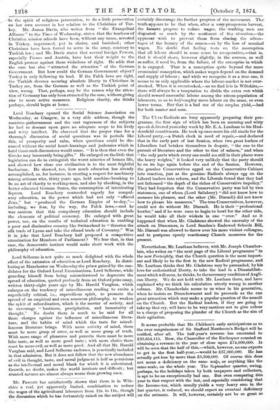Lord Rosebery opened the Social Science Association on Wednesday, at
Glasgow, in a very able address, though the omnium-gatherumness and the vast vagueness of the subjects be had to descant upon gave no adequate scope to his lively and witty intellect. He observed that the proper time for a thorough discussion of social questions was in periods like this, of prosperity and calm, when questions could be dis- cussed without the social heart-burnings and jealousies which in hard times such discussions would cause. " It is then that even the Greeks may innocently bring gifts." He enlarged on thelittle that legislation can do to extinguish the worst miseries of human life, and showed how close our civilisation is to the most frightful barbarism. He showed, too, how much education has already accomplished, as, for instance, in creating a respect for machinery among artisans who, thirty years ago, held machine-breaking to be an act of charity to working-men, and also by checking, in the better educated German States, the consumption of intoxicating liquors. Lord Rosebery contended eagerly for compul- sory education, as the power which had not only "effaced Jena," but "produced the German Empire of to-day,"- including, we fear, by the way, the Falck laws,—and he was anxious that this compulsory education should include the elements of political economy. He enlarged with great power, too, on the results of technical education in enabling a poor and diminutive country like Switzerland to " threaten the silk trade of Lyons and take the riband trade of Coventry." Was it in joke that Lord Rosebery half proposed a competitive examination for Members of Parliament? We fear that, in that case, the democratic instinct would make short work with the philosophy •of education.


































 Previous page
Previous page